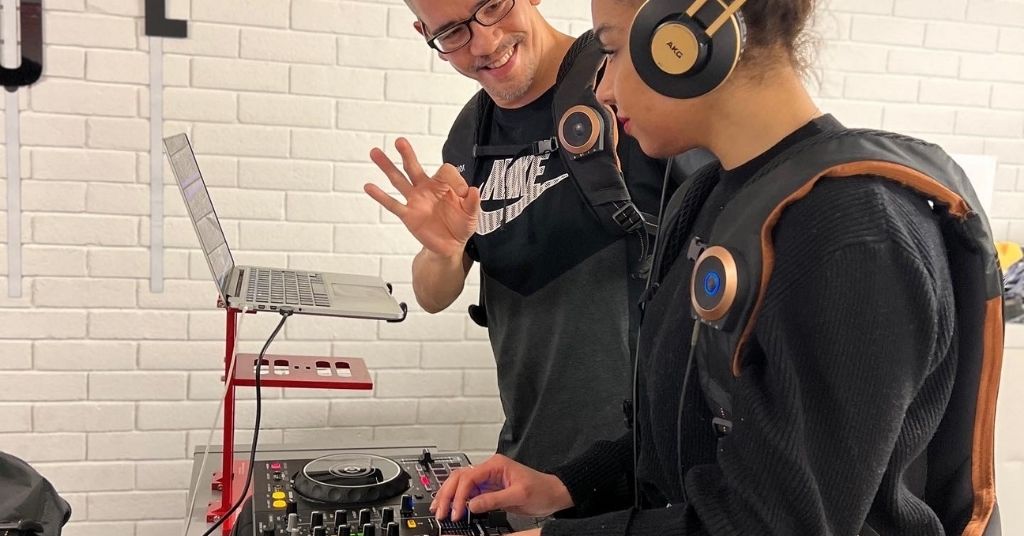
How my Hearing Aids Have Helped my Tinnitus
September 2, 2020
Tips for going to sleepovers with a hearing loss
September 7, 2020Zoe Nutt, a musician with hearing loss, releases new album “How Does It Feel”

Losing one’s hearing at a young age, even if only in one ear may not seem like is a promising start for a future career in music.
That didn’t stop Zoe Nutt. In 2018, Nutt was on the cusp of finishing her second and breakout album, “How Does It Feel,” when the hearing in her “good” ear erupted in sudden and intermittent episodes that left her near-total deafness. Nutt didn’t quit. Nor did she quit when she took extended time off from recording to adjust to her cochlear implant that required that she teach herself to hear all over again. On July 24, 2020, Nutt released her newest album “How Does It Feel?” She shares her journey with us on how she pursues her passion for music as a musician wearing hearing technology.
When Nutt was a child, she found out about her moderate hearing loss in her right ear and was fitted with a hearing aid.
“I tried wearing a hearing aid around age five or six but the hearing loss in my right ear was already moderate to severe, so the aid didn’t help,” Nutt recalls. “I just functioned with one good ear at that time.”
Nutt was born and raised in Knoxville, Tennessee. Her grandmother performed in a traveling family band when she was growing up that toured around Tennessee. Nutt got the music bug listening to her parent’s record collection with Johnny Cash and David Byrne her early favorites. In high school. Nutt took private classical voice lessons and studied music theory, performed in school musicals, and sang in the school choir.
By the time she headed off to Belmont University in Nashville, Nutt was ready to spread her musical wings. She studied classical vocal performance but later switched majors and graduated with a Bachelor of Science in Songwriting and a Minor in Music. She also began composing her own songs and learned guitar to get more in tune with the requisite skill set of a budding singer-songwriter. In April of 2016, she released her first album, “Like You.”
Losing hearing in both ears
In 2018, Nutt’s doctors realized she was losing hearing in her left ear as well. They don’t know what happened but believe the hearing loss is progressive and that she could be on her way toward total hearing loss. Nutt felt the best chance to rescue her musical life was to get the cochlear implant surgery on her right ear done immediately.
Adjusting to playing music with a cochlear implant
Any musician who wears a cochlear implant can tell you the challenges of negotiating speech, much less music, with an implant are great and can be very frustrating. The frequency changes and sound adjustments make clear sound and simple music more difficult to hear and enjoy.
Read more: Overcoming Hearing Loss to Make Music Again
“I’m always cognizant of the fact that when I sing, what I’m hearing sounds very different from what the rest of the world is hearing,” Nutt adds.
Still, whether it’s her courage, perseverance, passion, or daring, Nutt has always found her way of creating music. She and her music will not be denied.
As a musician with a hearing loss, Zoe employs a variety of assistive devices to manage not only her day to day life but also her more advanced needs in the recording studio and on stage. In her right ear, she wears an Advanced Bionics cochlear implant and a Phonak hearing aid in her left ear. HearingLikeMe had the chance to ask Zoe more questions about being a musician wearing hearing technology.
Stu: Do you change settings for different situations?
Zoe Nutt: I don’t usually change the settings on my devices whether I’m going to the grocery store or playing on stage. I like the consistency.
Stu: Do you use floor monitors or in-ear monitors on stage or in the studio?
Zoe Nutt: Floor monitors don’t provide enough volume or clarity for me. In-ear monitors are not an option because I would need to take off my hearing devices in order to use them
Stu: What kind of auxiliary hearing device do you use if any?
Zoe Nutt: I use headphones. They help me isolate my vocal and any other instruments I need to hear without bleed-through from other sources on stage.
Stu: Are you able to stay in pitch readily?
Zoe Nutt: Yes, having that isolation makes it that much easier to stay in time because I’m not fighting to hear myself or my band. However, wearing headphones also means I can’t hear the audience very well, so being able to see people’s reactions to the songs is really helpful in gauging how I interact and talk between songs.
Stu: How do the headphones work over your hearing aids?
Zoe Nutt: My hearing devices have little microphones in them, so I can get a lot of feedback when I wear headphones. It took a while to find a pair that didn’t cause feedback from my aids. One day while I was recording in the studio, a friend had a pair of professional studio monitor headphones. I used them during the session and immediately bought a pair. They are the only headphones I’ve found that don’t create feedback. Because of the adjustable band, they’re also great for people with smaller heads, too.
Stu: How does your band and your engineer help with making adjustments on stage and in the studio?
Zoe Nutt: Like anyone else, if I can’t hear something, I ask the engineer to turn up the volume on a specific instrument, or lower the volume of surrounding instruments. Before I started using headphones, I would use floor monitors when I played live. I still have some hearing in my left ear so, I would place my bass player on my left side in order to hear the low notes better since the bass is giving all the root notes of the song as well as timing.
Stu: Is there a particular sound mix that you prefer?
Zoe Nutt: I like having as much of my band as possible standing pretty even with me. With the headphones on I still prefer my bass player on my left, lead guitar on my right, utility player on either side, and drums behind me. Staging everyone this way makes it easy for us to give each other visual cues and make any adjustments during the show. It’s also just a fun way to interact on stage.
Stu: Before going on stage are their particular habits or protocols that you follow?
Zoe Nutt: Before every show, I make sure my headphones are mixed properly. Hearing myself and my instruments clearly is paramount. I also make sure to explain to the engineer that I’m hearing impaired so they’ll understand why I need to spend extra time adjusting my headphone mix before the show. That line of communication makes a huge difference. Other than that, I just focus on playing my best show.
Stu: What happens if something goes off?
Zoe Nutt: I do have progressive hearing loss, so there are times when I will randomly lose a large amount of hearing all at once, but I just don’t let that get in my way. Any time that happens I call it an “episode”. Sometimes an “episode” lasts a week, sometimes a whole month.
I don’t have issues with pitch, even when I’m going through these “episodes” because I can lean on my classical training and practice. It’s really hard to hear myself or my guitar when these “episodes” hit so when that happens, I strictly practice at home with a microphone, my guitar plugged in, and headphones on in order to hear myself better.
Stu: I’m glad you brought that up. Musicians know about muscle memory. In fact, I am told that musicians have greater auditory memory than non-musicians. How does that work for you in the studio? Do you have trouble finding the key and holding it?
Zoe Nutt: My classical music and vocal performance training in high school and college is my steady hand. Classical singing relies heavily on muscle memory and anatomy when it comes to delivering a song. I learned early on to trust how something feels when I sing rather than just how it sounds. That’s a lesson that applies to all vocalists no matter their hearing. I’ve never had trouble finding what key I’m in or staying in key – it comes very naturally to me.
Stu: Teaching yourself to hear all over again – only someone with hearing loss and even more directly, a musician with hearing loss could possibly know what that means. Can you talk a little bit about that process? What you did to refine your hearing after losses and get used to your new tech. Did you have a specialist working with you?
Zoe Nutt: I made myself wear my hearing aid and cochlear implant every day, even when I didn’t enjoy it. I didn’t see any specialists. Cochlear implants don’t instantly bring back hearing. Everything sounds very distorted at first. I just made myself practice my instruments, talk to people, and live my life. It’s not easy, but it is doable!
Stu: Asked what she would like others, especially musicians with hearing loss, to take away from her story, Zoe offers a well-earned humility about herself and a keen insight about life.
Zoe Nutt: I have tinnitus and have lost the majority of my hearing, I don’t think about that every day. More than anything I’m inspired by the world around me. My song “Like You” is an exception to that, being a song that I wrote after I first lost hearing in my only working ear. I don’t view myself as inspirational. Hearing loss is a very small part of who I am.
“I have tinnitus and have lost the majority of my hearing, I don’t think about that every day. More than anything I’m inspired by the world around me.”
If you want to be inspired by me, I’d say this: You can choose to let your struggles define you, or you can choose to define them. Embrace and love yourself, including your hearing loss and any other difficulty or challenge in life, but don’t let it define or consume you. Into each life some rain must fall, but rain doesn’t have to be an awful thing. It can facilitate a lot of growth and help you find the sun.
“How Does It Feel,” Zoe Nutt’s latest album, was released July 24, 2020. You can keep up with her on social media and on her website.



